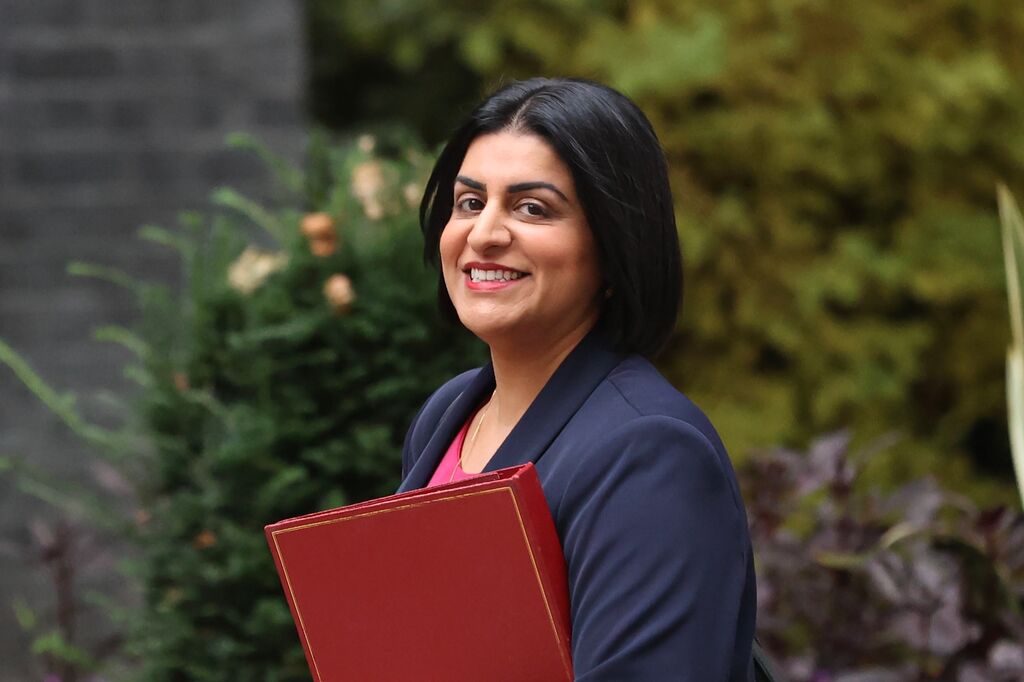How asylum reforms reveal what we think about immigration

This week the Home Secretary, Shabana Mahmood, introduced sweeping new reforms to the asylum policy in the UK. As she explained the new scheme to Parliament, she called them the biggest changes to tackle illegal migration in modern times. The package, which will need parliamentary approval before it comes into force, toughens the UK’s stance on refugees and asylum seekers. The measures include lengthening the time needed before applying for settled status, reducing the state’s requirement to give support, and forcibly removing asylum seekers once their country of origin is deemed ‘safe’.
This new policy comes among increased concern about immigration in the United Kingdom. A September YouGov poll found that immigration and asylum was the most important issue among voters. There has been increased discussion about immigration issues fuelled by the rise of Reform in the polls and their more radical stance on reducing migration.
Most of the main political parties in the UK actually agree that immigration needs to be addressed. Since 2021, 400,000 people have claimed asylum in this country, compared to 150,000 in the comparable time period of 2011-2015. Over 118,000 people have claimed asylum just this year, and over a third of those came to the UK in ‘small boats’ across the channel.
We want to be a nation of welcome, with a proud history of accepting those who have fled danger and persecution. A poll commissioned by the Refugee Council in January found that 69% of Britons were very or quite proud of Britain’s role taking in refugees since World War II, and 57% were strongly or somewhat in support of greater refugee integration.
Nevertheless, we only have so many resources to go around. No major political party is in favour of completely opening our borders and allowing anyone to settle in the country. There has to be some measure of sensible limits on immigration and fair rules about who can and cannot come and settle here.
Personally I think there is a lot to like about Shabana Mahmood’s proposals. They take seriously the complex issues involved with refugees and asylum seekers, give some helpful ways forward to reduce the incentive for illegal migration while maintaining our desire to accept those who are at risk.
But no legislation is perfect. As Christians we want our laws to reflect what God desires and what he has revealed through the Bible. These proposals expose significant dangers about the way we think about, and act on, immigration in the UK. In particular, I want to highlight three specific dangers:
Legal or illegal?
Much of the contemporary discussion about immigration concerns “illegal immigrants.” But this is a complicated and loaded term. ‘Illegal immigration‘ can cover a number of different groups of people and ways into this country.
Legal immigration is where people come to the UK via a legal route, such as with a student or work visa. Illegal immigration, on the other hand, is where migrants choose a route into the UK by illegal means. This might be by small boat across the English Channel, or by outstaying their visa and continuing to stay and work in the the country.
Some people choose to enter the country illegally because conditions of life here are still better than the country that they left. Refugees, however, come fleeing fear of persecution in their home country. They come to the UK as a place of safety, seeking asylum from the danger they face. That could come as a result of a person’s race, religion, nationality or political opinion. For example, a person may come to the UK from China because they are part of an unsanctioned house church and faces persecution for being a Christian.
There are some limited legal routes for refugees to enter the UK. The government has arrangements to bring some people to the country as refugees from specific nations for specific reasons, such as those fleeing the war in Ukraine or the Taliban regime in Afghanistan. At present legal routes for asylum only exist for those two countries and no others.
Asylum seekers from any other country, who don’t meet the requirements of those legal arrangements, may have no other option than to enter the country illegally.
You can only apply for asylum in the UK while you are physically in the UK. That means a person seeking asylum has to get here first before they can apply and prove their status. Some are able to get into the UK legally at first, through a work or student visa for example, and then apply for asylum. But for many others, their only recourse is to get here by any means necessary: via small boats across the channel, hidden in lorries, or stowed away on airplanes. There is no ‘asylum visa’ and no legal route to apply for asylum outside of the UK.
Sadly this need to get to the UK to claim asylum fuels the market for smugglers getting people into the country. As Prime Minister, Keir Starmer, notes in the introduction to the new proposals, “there is nothing compassionate about allowing the vile trade in people-smuggling that perpetuates illegal migration to persist.”
The UK is a signatory to the 1951 UN Refugee Convention which states that genuine refugees who are in the process of having their status recognised are not “illegal immigrants” regardless of how they entered the country. Many have no other recourse than to use illegal methods.
Yet in many discussions, “illegal immigrant” is used as a blanket to describe various groups and types of people. It often lumps together voluntary migrants with those who are seeking asylum. Labelling everyone in this category as ‘illegal’ is unhelpful and often dehumanising. As Simone Weil states in her essay The Power of Words, “corresponding to each empty abstraction there is an actual human group.”
As Christians it is important for us to treat those who ask for help with fairness and compassion. God tells the people of Israel: “When a foreigner resides among you in your land, do not mistreat them. The foreigner residing among you must be treated as your native-born. Love them as yourself, for you were foreigners in Egypt” (Leviticus 19:33-34). This is not an excuse for completely open borders, because the word for ‘foreigner’ is more like someone with settled status as my colleague explains in this article.
Part of treating others with compassion is being careful with the way we speak and the words that we use. The book of Proverbs states its aim as: “teaching you to be honest and to speak the truth, so that you bring back truthful reports” (Proverbs 22:21). We need to be clear and truthful in what we say and report to others, in every sphere, including immigration.
If we don’t want to label every asylum seeker as ‘illegal’ we need to have clear, accessible legal routes for people genuinely fleeing persecution to find safety in this country. The right answer is not to turn everyone away, or to make the process unworkable, but to provide a sensible pathway for those in genuine need.
Duty or power?
One of the changes in the new proposals is a shift from ‘duty’ to ‘power’:
We will remove the current legal obligation to provide support to asylum seekers who would otherwise be destitute… In the coming months this duty will be revoked, and we will restore a discretionary power to offer support, as previously provided under UK law.
The move from duty to power is significant. A duty signifies something we ought to do; a power is something we may do but are not obliged to carry out.
At present, the UK is under the UN Refugee Convention and the European Convention on Human Rights (ECHR). These spell out the duties and obligations of countries to treat their citizens well, and to treat refugees in a fair and humane way.
Additionally, until Brexit the UK was also under European law that gave an obligation to provide material support to those seeking asylum who would otherwise be unable to provide for themselves.
Under the new proposals, this ‘duty’ to support those who would be destitute is replace by a ‘power’ to support them. The obligation to provide material help is replaced by the ability to help, which is an ability that can be removed.
The ECHR also spells out a duty to prevent people from being “subjected to torture or to inhuman or degrading treatment or punishment” (Article 3) and a duty to uphold a person’s right to “respect for his private and family life” (Article 8). The UK are looking to clarify their rights and responsibilities under these two articles, to allow them to prevent family members from joining asylum seekers, and to prevent people from complaining about their removal if they fail to be granted asylum.
As noted already, there are only so many resources that the government has to support people. Government funds are stretched and there have to be limits on the number of asylum seekers to whom it can give help.
But as Christians, we recognise that we not only have the power to help others, we have the duty to help them as well. Jesus taught that the Old Testament teaching could be summed up in two commands: love God, and love your neighbour. When pushed about who qualifies as our ‘neighbour’, Jesus told the parable of the Good Samaritan, where a foreigner and stranger of a nationality that would have been shunned shows help and kindness. At the end of the parable, Jesus issues the command: “Go and do likewise” (Luke 10:37).
Christians move from could to ought, not as a way of earning merit, but as a response to unearned grace. In light of God’s salvation and Jesus’ coming return, Peter asks: “what kind of people ought you to be? You ought to live holy and godly lives” (2 Peter 3:11). This shows itself in the way in which we treat others. As John explains in his first letter: “Dear friends, since God so loved us, we also ought to love one another” (1 John 4:11). We have the power to care and the duty to care as well.
We need to be honest about the limits on the support we can give to refugees and asylum seekers, and the numbers that we can realistically take into the country. But we should not cut off support from those who in need; we should recognise our duty to care as well as our power to do so.
Integrated or separate?
Another key change in the new proposals is quadrupling the time it takes for someone to be granted Indefinite Leave to Remain. Currently, once a person has been in the UK for five years, they can apply for leave to remain which essentially means they can be here for life. Under the new proposals, people would need to wait 20 years before they could apply for Indefinite Leave to Remain. This will apply not only to those seeking asylum but also to those coming into the UK legally for work or study.
Refugees will come under a new ‘Core Protection’ status which will be reviewed every 30 months. This will be renewed for another 30 months if the person is judged still needing protection. If not, they will be eligible for removal back to their home country.
The idea behind these measures is to remove the incentive for people to come to the UK to seek asylum. If the path to settled status is long and complex, then the demand to enter the country will reduce, or so it is hoped.
What this means in practice is a long wait for a person to feel settled, and beyond that to feel welcomed. While we don’t want to be unwise about our borders, we also want to be a country that welcomes the outsider. We have benefitted greatly from those who come from overseas, such as in the NHS where over a quarter of all nurses are from outside the UK.
The balance between welcome and waiting is a tricky one, and personally I am not sure I know what the right timings are. But we need to be ensure that our aim is to integrate migrants rather than keep them separate. A long wait for leave to remain could delay integration. If you don’t know how long you might be able to stay for, your incentive to be part of the country and contribute to it will be reduced.
One specific challenge to integration over separation in the new proposals is that of integrating families. Up to this point, Article 8 of the ECHR has ensured that family life is protected, and that asylum seekers can bring their families to join them in the UK. The new measures look to change this. They say that “Under Core Protection there will be no automatic right to family reunion.”
I am sure there have been misuses and abuses of the family protections. But throwing out those protections entirely undermines the importance of the family. It is a gift given by God (Genesis 2:24), affirmed by Jesus (Matthew 19:4-6) and given as a structure for bringing up children (Ephesians 6:1-4). While not every parenting relationship looks like the ‘nuclear family’, keeping families together has benefits for everyone involved and honours what God has said about family.
A moral mission
After launching these new proposals this week, Shabana Mahmood spoke to the BBC and said that changing the asylum system was a “moral mission” for her:
If we don't win this argument… we will lose public support for having an asylum system at all and therefore we'll lose something brilliant about this country. I'm not willing to put public support for having an asylum system at risk.
This is an important point. Failure to grapple with the issue of immigration could lead to support for far-right ideologies that dismantle the asylum system completely and stoke fear and hatred. The Home Secretary has an unenviable job in trying to get this right, and she deserves our respect and our prayers.
These proposals are helpful but imperfect. We need to ensure that clear, legal routes to asylum are open to those who flee persecution. We need to acknowledge our duty to care as well as our power to do so. We need to aim for integration instead of isolation, and keep families together wherever possible.
We also have a responsibility to think and speak carefully about this issue. That too is a ‘moral mission’ for Christian believers. We need speak truthfully about what is ‘legal’ and ‘illegal’ and avoid the path of dehumanising groups of people with the language we use. We need to call our government, and future governments, to account for using their powers justly and fairly, and to recognise our collective duty to protect the needy and vulnerable. We need to welcome the stranger and outsider in our communities, and in our churches. After all, we are foreigners and exiles in this world and have been brought into the family of God (1 Peter 2:9-11). We tread the narrow path of being wise and welcoming at once.






